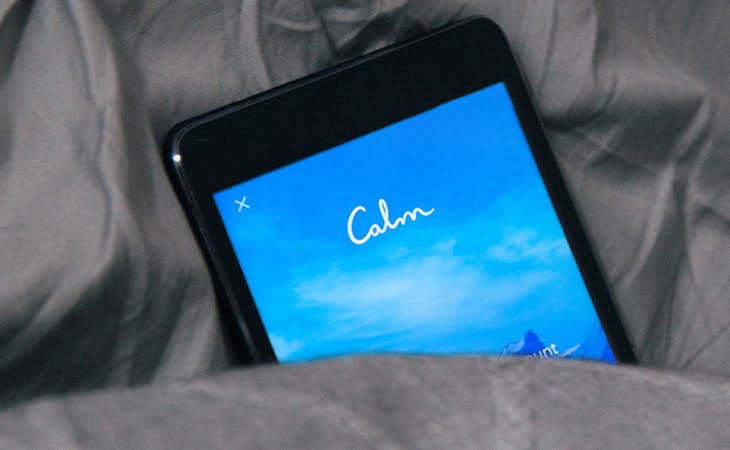Like millions of Americans, I have trouble sleeping at night. I suffer from anxiety—which means when my head hits the pillow, I often have a really hard time shutting my brain off. I replay a conversation I had that day at work with my boss and think about what I could have said differently. I worry about my future, where I’ll be in a year or two, and any number of things that haven’t happened yet. No matter how exhausted I am when I get into bed, these thoughts keep me awake and wired, making sleep feel like a far-off destination.
I’ve tried counting sheep, different breathing exercises, and infusing my humidifier with lavender essential oil, but none of those worked all that well. So I decided to take a more high-tech approach and give a few sleep apps a try. These apps are marketed to people like me who have trouble falling and staying asleep.
Sleep app reviews
While Terry Cralle, RN, certified clinical sleep educator, notes that sleep apps won’t replace good habits like establishing a bedtime routine and avoiding late-night computer sessions, she says they could be helpful for people who have trouble relaxing before bed.
Here’s what I thought of three popular sleep apps.
Pzizz
The Pzizz app promises to help users fight insomnia through sequences of sounds, called “dreamscapes,” tailored to various portions of the sleep cycle. Layered over the dreamscapes are voice narrations based on clinical sleep interventions, such as mindfulness meditation, guided imagery, and progressive muscle relaxations.
I found the narrations unpleasant and distracting, so was I grateful for the ability to control the volume of both the soundscapes and the voiceovers—or to mute the voiceovers entirely. The sound sequences, however, were enchanting and lulled me to sleep each night I used the app. I also enjoyed reading the prompts before each dreamscape, which explain the scientific research behind the creation of each sound sequence. (Pzizz has a dedicated researcher on staff whose job it is to take academic papers and translate them into actionable material that audio engineers can then use to produce the dreamscapes. Pretty cool!)
I used this app for about a week and grew so used to the sound sequences I wasn’t sure how I was going to sleep without them.
Calm
For someone who’s practiced yoga for several years, I’ve never been particularly good at meditating. That changed when I downloaded Calm. The app has a number of different features and includes bedtime stories (one of which is narrated by Matthew McConaughey) and recordings of painting sessions with Bob Ross. There’s also a ton of soundscapes and nature melodies like crashing ocean waves and falling rain, but I found the meditation series to be the most effective.
The app boasts several series, from managing stress and anxiety to breaking habits, all written and narrated by mindfulness instructor Tamara Levitt, whose voice is so calming that just listening to her instantly makes me feel more relaxed. The “7 Days of Sleep” series really gets to the root of why most of us have trouble sleeping and offers strategies to help change unhelpful thinking patterns associated with sleep. Best of all, the guided meditations come in various lengths of time from over a half hour to just five minutes so you can choose the one that’s right for you.
I definitely noticed a big difference in sleep quality during my week of using the Calm app and am considering starting a paid yearly subscription.
Sleep Cycle
A self-described “intelligent alarm clock,” Sleep Cycle uses your phone’s microphone to analyze your sleep and wakes you up at the point in your sleep cycle when you will feel the most rested and refreshed. After a few days, the sleep app provides statistics on your sleep in easy-to-read charts and graphs that look at quality of sleep, number of hours in bed, wake-up time, and whether or not you snored. It also offers sleep aid sounds like heavy rain, a babbling brook, countryside ambiance, and white noise.
I used this app for about a week. Most days I awoke before the sound of the alarm, but on the days when the app woke me, I did feel surprisingly rested and found it easier to get out of bed without my usual snoozing. Seeing how long I spent in bed and how many of those hours were spent asleep also encouraged me to stick to an earlier bedtime. I found it a helpful tool in getting better sleep, though I often found it more useful to pair it with one of the other sleep apps to help me drift off. (Learn whether ChatGPT can help you sleep.)
The bottom line on sleep apps
The bottom line: Overall, the apps really did improve my ability to fall and remain asleep. While I had a positive experience, Cralle cautions these sleep apps may not work for everyone. “For ongoing sleep problems, I would recommend seeing a sleep specialist,” she says. “I would not ignore insomnia symptoms—or any other sleep problems that persist. Sleep disorders and related medical conditions should be addressed in the face of ongoing sleep problems.”
For more help catching Zzz’s, listen to these podcasts guaranteed to bore you to sleep.




